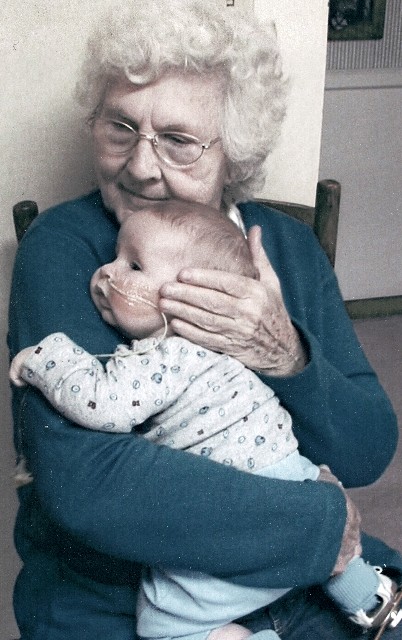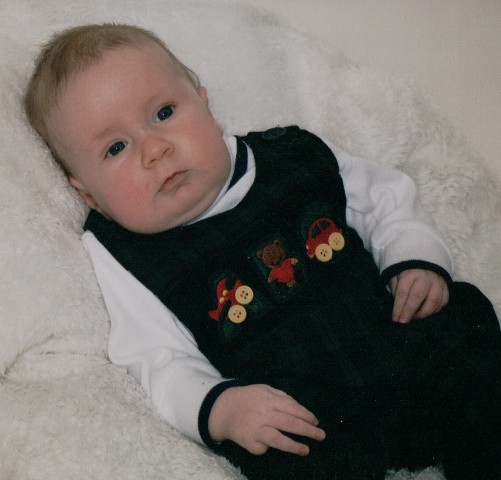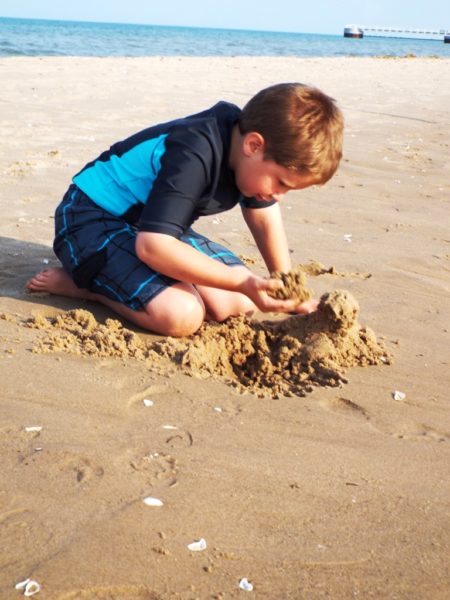Researchers are unsure what causes Prader-Willi syndrome (PWS). We know that it is a genetic error of the 15th chromosome and that it doesn’t discriminate ethnic groups, gender, or age of parents. Every person who has Prader-Willi syndrome is unique and very different!
The Feeding Tube

Infants are born with hypotonia (weak, limp muscles), and poor sucking capability. Like most Prader-Willi babies, Andrew was fed with a feeding tube. The entire family was taught to insert the feeding tube through his nose, into his stomach and then how to use a stethoscope to make sure the tube was inserted properly. As Andrew grew and became more active in his sleep, I feared the tube would become wrapped around his neck. I searched for other feeding methods and came up with the Haberman Feeding Bottle which allowed me to help squeeze the milk gently while Andrew attempted to suck. I remember how nice it was to see Andrew without the feeding tube taped to the side of his face. The Haberman bottle was a game-changer.
Hypotonia
Because of the lack of muscle tone, also known as Hypotonia, Andrew rarely cried and he slept through the nights. It was up to me to wake him for feedings. There is a big difference between holding a normal muscle tone infant and one with low tone. All babies are awesome to hold but the child with Prader-Willi syndrome is soft, pliable and marshmallow-y. They melt and conform to your body. I didn’t understand fully what muscle tone meant until after I had Andrew and held a normal-toned baby. I found myself saying, “This child has more muscles in their little toe than Andrew has in his whole body.” A normal-toned child feels strong and firm. To this day, I’m amazed at how strong children are in infancy.

Growth Hormone
Because of the lack of muscle tone, the person with Prader-Willi syndrome burns less calories than their peers. Healthier, less caloric foods are important. Growth Hormone is the only drug that is approved by the FDA for persons with Prader-Willi. It aides in increasing height, muscle mass and stamina. Most infants and young children start taking Growth Hormone at an early age. My mom-instinct never felt we needed it and our medical team agreed. When Andrew was 8, regardless of how I altered our meals and activities, I noticed that Andrew was gaining weight. Andrew was shorter than his peers and as his weight increased, his stamina decreased.
Our diet and activity hadn’t changed; what had changed was Andrew’s growth. It had slowed considerably. Once Andrew started Growth Hormone at age 9 and he outgrew his good shoes, it was then that I realized that we had not purchased a new pair of church shoes in three years! I also noticed an increase in Andrew’s stamina. Instead of skiing for two-hour periods, I found us skiing for four to five hours with a lunch break.
Hyperphagia
Prader-Willi syndrome affects the hypothalamus which is a part of the brain that registers hunger, thirst, satiety, and body temperature. PWS is genetic and is not a condition that can be outgrown. Persons with Prader-Willi never feel full, even after they have ate. Hyperphagia, or hunger begins between 2-5 years of age. This hunger leads to food seeking, behavior, and in some cases, if not controlled, obesity. Food must be controlled 24/7. Andrew was about 5-years old when I first caught him sneaking food. We now have locks on food storage cabinets.

Scheduled Routine
I have always controlled our food and have kept meal times regimented. I noticed that the more active we were it left Andrew with little time to think about food. Routine and schedule equals ‘relaxed happiness’. However, to travel and cross time zones, I needed to know that I could attempt to control unexpected changes in routine. As Andrew aged, I mixed up our meal times. I begin to train him in ‘change’. Regardless of how much change I created, I can tell time by Andrew’s trained, internal clock to eat at our set hours. He innately knows when it is time to eat and he wastes no time in letting me know!
Locks for Security
As Andrew aged and became smarter in the food-sneaking arena, food became a stress issue. Homeschooling allows me to control our food environment, but when I was in the shower I needed to know that Andrew was safe. It broke my momma’s heart, but I knew that it was time to install locks for food security.
Holiday Stress

Christmas Ornaments at Bronners in Frankenmuth, Michigan.
Food is a fixed focus in our culture and unfortunately it is used for rewards, encouragement, entertainment, and social get-togethers. Many families, caregivers, and persons with Prader-Willi find holidays rough. Our homes are void of candy dishes and food on the counters. We skip cookie bakes and pot luck meals. Parents and caregivers in charge of a person with Prader-Willi syndrome must control their food intake and in some cases have to deny food, especially during the holidays. Changes in routine, food control, and denial of food can cause the person with Prader-Willi to meltdown. The lack of understanding outside the Prader-Willi family unit causes additional stress. These are just a few issues that can tear apart families thus leaving the Prader-Willi family feeling isolated.
National Association of Prader-Willi syndrome
Support for caregivers and families are important. The National Association of Prader-Willi syndrome is in Sarasota, Florida and can help connect families. They offer a crisis hotline and informational materials. Many states also have PWS chapters that offer support, get-togethers, and fundraisers. Of course, no organization can operate without volunteers and donations.
Support by donation is always appreciated! Just say, “Andrew sent you!”



